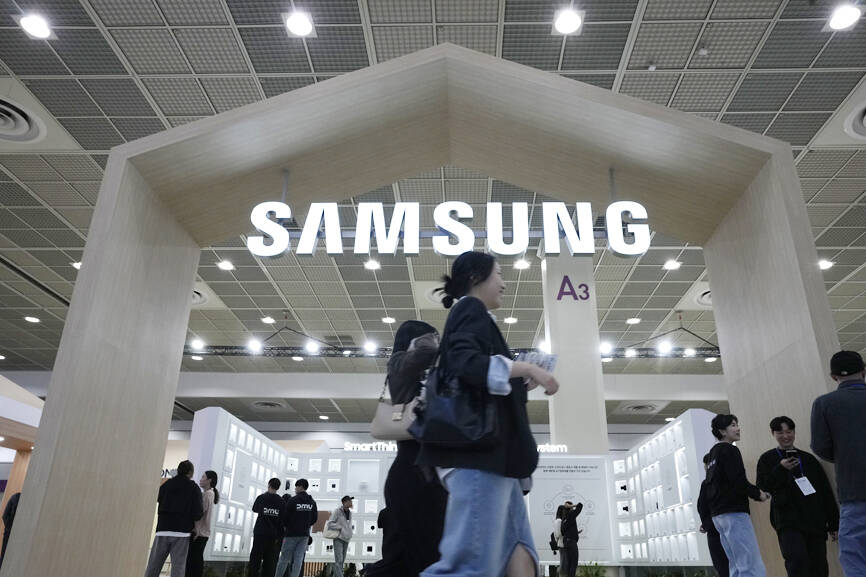Samsung Electronics Co plans to buy back about 10 trillion won (US$7.2 billion) of its own stock over the next year, putting in motion one of the larger shareholder return programs in its history.
South Korea’s biggest company would repurchase the stock in stages over the coming 12 months, it said in a regulatory filing on Friday.
As a first step, it would buy back about 3 trillion won of paper starting today up until February next year, all of which it would cancel. The board would deliberate on how best to effect the remaining 7 trillion won of buybacks.

Photo: AP
The move coincides with investors’ growing concerns about the firm’s memory chip business, which is struggling to keep pace with SK Hynix Inc.
Samsung’s smaller rival has become the dominant supplier of high-bandwidth memory (HBM) to Nvidia Corp, which uses the cutting-edge chips in its popular artificial intelligence (AI) accelerators.
That has sparked fears that Samsung — long the dominant force in global memory semiconductors — is missing out on the AI boom.
Investors are also trying to gauge its vulnerability to US president-elect Donald Trump’s protectionist trade policy, given its exposure to China.
Samsung’s shares rose 8.6 percent on Friday before the buyback announcement, though it remains down 32 percent on the year.
The world’s largest maker of smartphones is also grappling with a consumer electronics slump globally.
Its stock is trading at a discount of more than 10 percent to the consensus estimate for its one-year forward accounting book value, according to data compiled by Bloomberg.
Last month, Samsung declared progress in qualifying and supplying its most advanced AI memory chips to Nvidia.
The company now expects to start selling its most advanced HBM3E memory chips in the fourth quarter, Jaejune Kim, executive vice president of Samsung’s memory business, said on an earnings call at the time.
Still, some investors remain cautious about the outlook.
“A lower valuation is justified given trade risks around Korea and also the catch-up in HBM, which will take time, and a weak memory environment,” said Sat Duhra, a fund manager at Janus Henderson Group.
“There are better tech stocks to own here — most of them are in Taiwan,” he said.

TAKING STOCK: A Taiwanese cookware firm in Vietnam urged customers to assess inventory or place orders early so shipments can reach the US while tariffs are paused Taiwanese businesses in Vietnam are exploring alternatives after the White House imposed a 46 percent import duty on Vietnamese goods, following US President Donald Trump’s announcement of “reciprocal” tariffs on the US’ trading partners. Lo Shih-liang (羅世良), chairman of Brico Industry Co (裕茂工業), a Taiwanese company that manufactures cast iron cookware and stove components in Vietnam, said that more than 40 percent of his business was tied to the US market, describing the constant US policy shifts as an emotional roller coaster. “I work during the day and stay up all night watching the news. I’ve been following US news until 3am

UNCERTAINTY: Innolux activated a stringent supply chain management mechanism, as it did during the COVID-19 pandemic, to ensure optimal inventory levels for customers Flat-panel display makers AUO Corp (友達) and Innolux Corp (群創) yesterday said that about 12 to 20 percent of their display business is at risk of potential US tariffs and that they would relocate production or shipment destinations to mitigate the levies’ effects. US tariffs would have a direct impact of US$200 million on AUO’s revenue, company chairman Paul Peng (彭雙浪) told reporters on the sidelines of the Touch Taiwan trade show in Taipei yesterday. That would make up about 12 percent of the company’s overall revenue. To cope with the tariff uncertainty, AUO plans to allocate its production to manufacturing facilities in

Six years ago, LVMH’s billionaire CEO Bernard Arnault and US President Donald Trump cut the blue ribbon on a factory in rural Texas that would make designer handbags for Louis Vuitton, one of the world’s best-known luxury brands. However, since the high-profile opening, the factory has faced a host of problems limiting production, 11 former Louis Vuitton employees said. The site has consistently ranked among the worst-performing for Louis Vuitton globally, “significantly” underperforming other facilities, said three former Louis Vuitton workers and a senior industry source, who cited internal rankings shared with staff. The plant’s problems — which have not

COLLABORATION: Given Taiwan’s key position in global supply chains, the US firm is discussing strategies with local partners and clients to deal with global uncertainties Advanced Micro Devices Inc (AMD) yesterday said it is meeting with local ecosystem partners, including Taiwan Semiconductor Manufacturing Co (TSMC, 台積電), to discuss strategies, including long-term manufacturing, to navigate uncertainties such as US tariffs, as Taiwan occupies an important position in global supply chains. AMD chief executive officer Lisa Su (蘇姿丰) told reporters that Taiwan is an important part of the chip designer’s ecosystem and she is discussing with partners and customers in Taiwan to forge strong collaborations on different areas during this critical period. AMD has just become the first artificial-intelligence (AI) server chip customer of TSMC to utilize its advanced